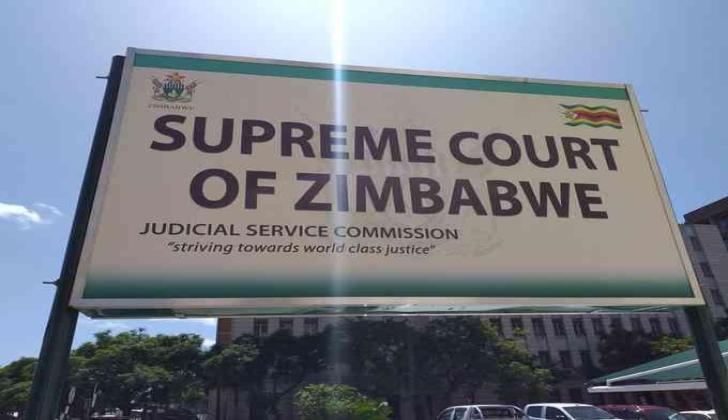News / National
Supreme Court orders eviction of Chief Zimunya, 1500 families
13 Jul 2025 at 10:25hrs |
10 Views

The Supreme Court has ordered the eviction of then Acting Chief Kibben Bvirindi, known as Chief Zimunya, along with approximately 1,500 families who have occupied Grove Farm in Mutare's peri-urban area since 1985.
Ironically, the Zimbabwean government originally approved the occupation of Grove Farm by the Zimunya people in the 1980s. Over the decades, the area developed into a well-established peri-urban zone with modern amenities including electricity, piped water, well-maintained roads, schools, health centers, and even a government-built modern chief's court.
The eviction order was granted following an appeal by Borniface Nyamanhindi, proprietor of Nyamanhindi Investments Private Limited, who purchased the farm in 1992. The company was represented by Saratoga Makausi Law Chambers, while Acting Chief Bvirindi was represented by Advocate Tatenda Musara. The Ministers of Agriculture and Local Government, also respondents, were represented by Peter Garwe.
The Supreme Court panel- Justices Chinembiri Bhunu, Samuel Kudya, and Hlekani Mwayera- issued the eviction order on February 11, 2025, but stayed the execution until June 30, 2025, to allow time for a possible settlement between Government and Nyamanhindi Investments. However, the deadline has since passed without resolution, prompting Nyamanhindi to instruct the High Court Sheriff to enforce the eviction.
A writ of ejectment dated July 8, 2025, directs the Sheriff to remove Chief Zimunya, the families, their possessions, and all occupants from the farm to allow peaceful possession by Nyamanhindi Investments.
Nyamanhindi Investments first approached the Supreme Court after the Mutare High Court dismissed its eviction application in May 2024. The company has repeatedly sought a settlement with Government through the Ministry of Lands since 2019, but to no avail.
Chief Zimunya explained in court that his people were forcibly removed from their ancestral lands by the colonial government in 1945 and relocated to what is now the 30 Miles area. After Zimbabwe's independence, he petitioned the new government to allow his people to return to their original land, a request that was granted in 1985. The original farm owner at the time did not oppose the relocation.
Since then, the government facilitated the development of infrastructure to serve the growing population on Grove Farm, including schools, health centers, shops, modern houses, and a chief's court.
Nyamanhindi Investments acquired the farm with a title deed in 1992, which carried a government caveat placed in 1995 as a notice on the property. The company successfully obtained a default judgment to remove the caveat in 2019, but its efforts to reach a settlement with the government failed.
Following the Supreme Court's eviction ruling and the expiry of the settlement period, the eviction process is now underway, stirring uncertainty for the thousands of families who have called Grove Farm home for four decades.
The dispute highlights the complex legacy of land allocation and ownership in Zimbabwe's peri-urban areas, raising critical questions about the balance between private property rights and long-standing community settlements.
Ironically, the Zimbabwean government originally approved the occupation of Grove Farm by the Zimunya people in the 1980s. Over the decades, the area developed into a well-established peri-urban zone with modern amenities including electricity, piped water, well-maintained roads, schools, health centers, and even a government-built modern chief's court.
The eviction order was granted following an appeal by Borniface Nyamanhindi, proprietor of Nyamanhindi Investments Private Limited, who purchased the farm in 1992. The company was represented by Saratoga Makausi Law Chambers, while Acting Chief Bvirindi was represented by Advocate Tatenda Musara. The Ministers of Agriculture and Local Government, also respondents, were represented by Peter Garwe.
The Supreme Court panel- Justices Chinembiri Bhunu, Samuel Kudya, and Hlekani Mwayera- issued the eviction order on February 11, 2025, but stayed the execution until June 30, 2025, to allow time for a possible settlement between Government and Nyamanhindi Investments. However, the deadline has since passed without resolution, prompting Nyamanhindi to instruct the High Court Sheriff to enforce the eviction.
A writ of ejectment dated July 8, 2025, directs the Sheriff to remove Chief Zimunya, the families, their possessions, and all occupants from the farm to allow peaceful possession by Nyamanhindi Investments.
Nyamanhindi Investments first approached the Supreme Court after the Mutare High Court dismissed its eviction application in May 2024. The company has repeatedly sought a settlement with Government through the Ministry of Lands since 2019, but to no avail.
Chief Zimunya explained in court that his people were forcibly removed from their ancestral lands by the colonial government in 1945 and relocated to what is now the 30 Miles area. After Zimbabwe's independence, he petitioned the new government to allow his people to return to their original land, a request that was granted in 1985. The original farm owner at the time did not oppose the relocation.
Since then, the government facilitated the development of infrastructure to serve the growing population on Grove Farm, including schools, health centers, shops, modern houses, and a chief's court.
Nyamanhindi Investments acquired the farm with a title deed in 1992, which carried a government caveat placed in 1995 as a notice on the property. The company successfully obtained a default judgment to remove the caveat in 2019, but its efforts to reach a settlement with the government failed.
Following the Supreme Court's eviction ruling and the expiry of the settlement period, the eviction process is now underway, stirring uncertainty for the thousands of families who have called Grove Farm home for four decades.
The dispute highlights the complex legacy of land allocation and ownership in Zimbabwe's peri-urban areas, raising critical questions about the balance between private property rights and long-standing community settlements.
Source - Mirror
Join the discussion
Loading comments…




































